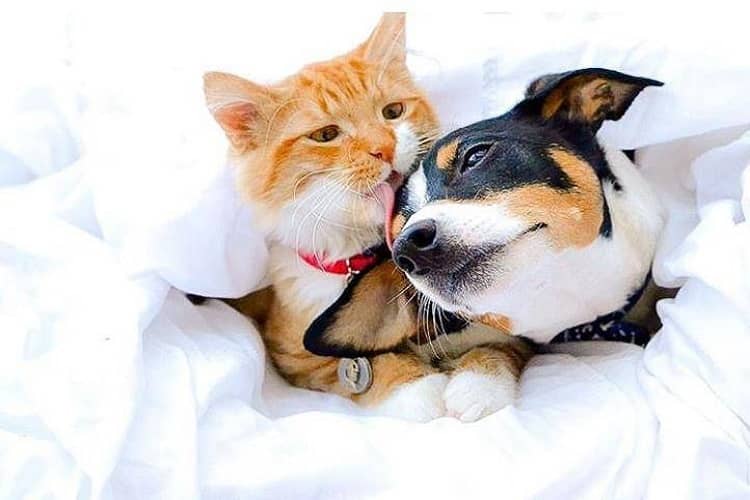Why Dogs Are Better Than Cats? Overall Analysis And Discussion

Dogs are generally considered more social, active, trainable and loyal to their owners. They also require more attention and exercise than cats, making them a great choice for people who enjoy outdoor activities and have the time and resources to devote to their pet.
On the other hand, cats are independent animals that require less attention and exercise than dogs, making them suitable for people who have a busy lifestyle and can’t devote much time to their pet. They are also known to be excellent companions and can provide great emotional support.
Ultimately, dogs and cats are both popular choices for pets, but they have unique temperaments and personalities. The decision of which pet to get should be based on what suits your lifestyle and needs, and whichever pet you choose, they will undoubtedly bring joy and companionship to your life.

Table of Contents
Why do some people think dogs are better than cats?
There are several reasons why some people think dogs are better than cats. Here are some of the most common ones:
- Loyalty: Dogs are often seen as more loyal than cats because of their pack mentality. They are wired to bond with their owners and are known for their unconditional love and affection toward them.
- Playfulness: Dogs are more playful than cats and enjoy interactive games and activities with their owners. This makes them great companions for people who enjoy spending time outdoors and being active.
- Protection: Dogs can provide protection and security for their owners and their properties. Some breeds are trained to alert their owners of potential danger, while others are trained to attack intruders in case of a break-in.
- Socialization: Dogs are social animals that thrive on human interaction and attention. They enjoy being part of the family and are known for their ability to bring people together.
- Trainability: Dogs are easy to train and can learn various skills and behaviors, such as obedience, agility, and search and rescue. This makes them useful for a variety of tasks and activities.
It’s important to note that while these traits may make dogs better suited for some people’s lifestyles and preferences, cats can also make great pets for others who are seeking low-maintenance companionship.

Why do some people think cats are better than dogs?
Just like some people prefer dogs, others prefer cats. Here are some of the most common reasons:
- Independence: Cats are more independent than dogs and don’t require as much attention or exercise. They are content lounging around the house and don’t need constant entertainment.
- Low Maintenance: Cats are generally easier to care for than dogs. They don’t require baths, grooming, or daily walks, and they are capable of using a litter box.
- Quietness: Cats are quieter than dogs, and their purring can be very soothing and calming. Their meows are also not as loud or disruptive as dog barks, making them more suitable for people who live in apartments or close quarters.
- Cleanliness: Cats are naturally clean animals and spend a lot of their time grooming themselves. They also don’t bring in as much dirt or debris from outside like dogs do.
- Affectionate: Cats can be very affectionate toward their owners but don’t require as much physical contact as dogs. This makes them a great choice for people who enjoy the company of animals but don’t want to be overwhelmed with constant attention.
Ultimately, the decision of whether to get a dog or a cat depends on the individual’s lifestyle, living situation, and personal preferences. Both cats and dogs can make wonderful companions, and each has its unique set of benefits and challenges.

Can dogs get along with cats?
Yes, dogs and cats can definitely get along. However, it ultimately depends on the individual personalities and temperaments of the animals and the steps the owners take to introduce them. Dogs and cats may have a natural instinctual antagonism towards each other, but when they are raised together or introduced slowly and properly, they can learn to coexist peacefully.
The introduction process should be gradual and supervised, particularly when one or both animals have no experience with each other. It’s advisable to keep them separated in the early days, perhaps using a pet gate or crate, so the animals can gradually adapt to each other’s smells and observe each other from a safe distance. Later on, the owners can consider introducing them with limited contact and always keeping an eye during their interactions as they get used to each other. Both pets should have a designated safe area from which they can retreat if they feel uncomfortable or anxious, such as a separate room with a door or baby gate.
With patience, positive reinforcement, and occasional treats, most dogs and cats can learn to live together harmoniously. It is important to note that certain dog breeds and cats, most notably hunting dogs and outdoor cats, may require more training and precautions to maintain a safe and peaceful living environment.

Are dogs or cats more expensive to take care of?
The cost of taking care of both dogs and cats can vary depending on many factors like the breed, age, health condition, and the owner’s lifestyle. However, here’s a general comparison of the typical costs involved:
Dogs are generally more expensive to take care of than cats. Dogs typically require more food, more frequent vet check-ups, and grooming, such as baths and haircuts. They may also require additional expenses, such as obedience training, toys, beds, and collars, and leashes. The larger the dog, the more expensive it typically is to care for them. Also, some dogs may need specific medical attention for breed-specific issues, which can vary in cost.
On the other hand, cats are typically less expensive to take care of than dogs. They require less food, may not need grooming as often, and they are usually independent enough to cope if you need to leave them at home alone during the day. However, cats may need regular vet visits to maintain their health condition, particularly if they live indoors, thus requiring you to maintain a litter box and purchase the necessary food, toys, and scratching posts.
In summary, both dogs and cats require financial investment for their proper care, and the expenses will depend on various factors. It’s advisable to research and factor in any additional expenses before bringing a pet into your home, so you can budget accordingly for their care.

Are cats or dogs better for apartment living?
Both cats and dogs can adapt to apartment living, however, generally, cats are better suited to apartment living than dogs. Here are some of the reasons why:
Firstly, cats are generally lower maintenance and require less space than dogs. They are more independent and can entertain themselves for long periods, sleeping or playing with toys. Also, they don’t need to be taken outside to do their business, and they can do their business in litter boxes.
Secondly, cats are usually quieter than dogs, which is particularly important if you live in an apartment block with neighbors in close proximity. Dogs, on the other hand, can be more vocal, especially if they are anxious, bored, or not getting enough exercise.
Lastly, some breeds of dogs require more exercise than others, which can be challenging in a small apartment. Dogs that need lots of exercise like Labradors or Border Collies may not be suitable for small living spaces. However, some dog breeds, such as Chihuahuas and French Bulldogs, are well-suited for apartment living. Cats, on the other hand, are more adaptable to confined spaces, and they can exercise themselves within the home.
In conclusion, while dogs can also adapt to apartment living, cats are generally better suited to this environment, require less space, are quieter, and need less exercise. It’s still crucial to keep in mind the particular needs and temperament of individual animals before choosing to adopt any pet for apartment living.

Are dogs really smarter than cats?
Whether dogs are smarter than cats is a matter of debate among pet owners, scientists, and researchers. Both dogs and cats are intelligent animals with unique skills and abilities. However, it is difficult to compare and rank their intelligence as they have different characteristics and are intelligent in different ways.
Dogs are social animals and are known for their ability to follow commands, read human emotions and body language, and assist humans in various tasks such as guiding the visually impaired and sniffing out drugs and explosives. They are also trainable for various activities such as obedience, agility, and search and rescue.
On the other hand, cats are solitary animals who use their intelligence to hunt prey, navigate unfamiliar territory, and solve problems. They have excellent night vision and are very agile, allowing them to stalk and pounce on their prey with precision.
Both dogs and cats are intelligent and can learn new skills and behaviors. So, it’s safe to say that it’s not whether one is smarter than the other, but rather that each has its unique set of skills and abilities.

Are cats or dogs easier to train?
Generally speaking, dogs are considered easier to train than cats. This is because dogs are pack animals and naturally understand the hierarchy and structure of the group. They are also motivated by rewards such as praise, treats, and playtime. Additionally, there are numerous obedience classes, training methods, and resources available to help owners train their dogs.
On the other hand, cats are more independent and have a reputation for being less responsive to training. While some cats can be trained to do tricks and behaviors through positive reinforcement, it requires more patience, consistency, and creativity on the owner’s part. Additionally, cats may not be as motivated by treats or attention, making them more challenging to train.
It’s important to note that every animal is different, and some cats may be more trainable than others. Ultimately, the success of training a cat or a dog comes down to the effort and dedication put in by the owner.

What are some common health problems for dogs?
Dogs can suffer from a wide range of health problems, some of which are more common than others. Here are some of the most common health problems for dogs:
- Obesity: Obesity is a major health problem for dogs, as it can lead to joint problems, diabetes, and heart disease.
- Dental Disease: Dental disease is very common in dogs, who can suffer from gingivitis, periodontitis, and tooth loss if their teeth are not maintained.
- Osteoarthritis: Osteoarthritis affects many dogs, particularly as they age. It can cause pain, stiffness, and mobility issues in the joints.
- Ear Infections: Ear infections are common in dogs, especially those with long or floppy ears. Dogs who swim frequently or have allergies are also at risk of developing ear infections.
- Skin Allergies: Dogs can develop allergies to a variety of things, including food, fleas, and environmental factors. Skin allergies can cause itching, redness, and discomfort in dogs.
- Urinary Tract Infections: Urinary tract infections (UTIs) are common in dogs, particularly females. Symptoms include urinating more often, straining while urinating, and blood in the urine.
- Cancer: Cancer is a leading cause of death in dogs. Some breeds are more prone to certain types of cancer, such as bone cancer in large breeds and lymphoma in Golden Retrievers.
If you suspect that your dog is suffering from any of these health problems, it’s important to take them to a veterinarian for diagnosis and treatment.
What are some common health problems for cats?
Cats can experience a variety of health problems, some of which are more common than others. Here are some of the most common health problems for cats:
- Dental Disease: Dental disease is very common in cats, particularly as they age. It can cause gingivitis, periodontitis, and tooth loss if their teeth are not cleaned.
- Urinary Tract Disease: Urinary tract disease is common in cats, particularly males. It can manifest as pain while urinating, blood in urine, or frequent urination.
- Obesity: Obesity is a growing problem in cats, and it may lead to issues like diabetes, liver disease, or reduced quality of life.
- Renal disease: Renal disease is a common health issue that affects cats. It can cause kidney damage and requires monitoring and management to maintain your cat’s health.
- Eye problems: Conjunctivitis and glaucoma are common eye problems that cats may experience. These symptoms can result from dry eyes and tears overproducing.
- Skin allergies: Cats may develop skin allergies as a reaction to environmental factors or food, leading to constant irritation on the skin and hair loss.
- Hyperthyroidism: Hyperthyroidism is a thyroid gland condition that will increase metabolism and blood pressure.
If you think your cat is experiencing any of these health conditions, it is always recommended to consult a licensed veterinarian to diagnose and treat the problem as soon as possible.
FAQ: About dogs and cats:
- What are the benefits of owning a dog?
Answer: Dogs provide companionship, can help with exercise and socialization, and can improve mental health by reducing stress and anxiety levels. - What are the benefits of owning a cat?
Answer: Cats provide companionship, are low-maintenance, and can improve mental health by reducing stress and anxiety levels. - Do dogs need daily exercise?
Answer: Yes, most dogs require daily exercise to stay healthy and happy. The amount of exercise a dog needs depends on the breed and individual dog. - Do cats need exercise?
Answer: Yes, cats need exercise too. However, they are generally less active than dogs and prefer short periods of playtime throughout the day. - What breeds of dogs are the most popular?
Answer: The most popular dog breeds in the United States include Labrador Retriever, German Shepherd, Golden Retriever, Bulldog, and Beagle. - What breeds of cats are the most popular?
Answer: The most popular cat breeds in the United States include Siamese, Persian, Maine Coon, Ragdoll, and Bengal. - Can dogs see color?
Answer: Yes, dogs can see some colors, but not all. They see the world in shades of blue and yellow, but not red and green. - Can cats see color?
Answer: Yes, cats can see colors, although they may not see them as vividly as humans. - Are dogs or cats better for protecting homes?
Answer: Dogs are better suited for protecting homes, as they are loyal and protective of their owners and have a strong sense of territoriality.
living.






